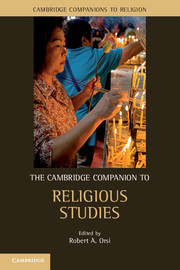Book contents
- Frontmatter
- Introduction
- Part one Religion and religious studies: the irony of inheritance
- Part two Major theoretical problems
- Part three Methodological variations
- 12 Buddhism and violence
- 13 Practicing religions
- 14 The look of the sacred
- 15 Reforming culture: law and religion today
- 16 Sexing religion
- 17 Constituting ethical subjectivities
- 18 Neo-Pentecostalism and globalization
- 19 Religious criticism, secular critique, and the “critical study of religion”: lessons from the study of Islam
- Index
17 - Constituting ethical subjectivities
from Part three - Methodological variations
Published online by Cambridge University Press: 28 March 2012
- Frontmatter
- Introduction
- Part one Religion and religious studies: the irony of inheritance
- Part two Major theoretical problems
- Part three Methodological variations
- 12 Buddhism and violence
- 13 Practicing religions
- 14 The look of the sacred
- 15 Reforming culture: law and religion today
- 16 Sexing religion
- 17 Constituting ethical subjectivities
- 18 Neo-Pentecostalism and globalization
- 19 Religious criticism, secular critique, and the “critical study of religion”: lessons from the study of Islam
- Index
Summary
On an April evening in 1999, in Sringeri, a small town in South India, the retired schoolteacher Meshtru and I walked together on our way to our homes after the lively celebrations of the Rama ‘s festival. We stood to chat at the street corner where our paths would part. “It went really well!” I said. Meshtru's family, with whom I had become friendly over the years of my research in Sringeri, had been publicly thanked for sponsoring the evening's festive activities. “It went well, yes, this service to Rama!” he acknowledged. Amid nods and goodnights to familiar passersby, he narrated this experience. I still had my tape recorder on from the music performance I had been recording at the celebrations we had just attended.
Meshtru: My father was initiated into the great Rama Tāraka Mantra by the previous guru.
My father lived a good long life; not once did he come to depend on others.
He died peacefully, chanting “Rama, Rama. …”
He dedicated a good part of his life to serving in the temple of Sharada.
But when he was dying, he said, “Despite the wealth we once had, today I am reduced to not having money even to have my corpse carried when I die.”
My brother assured him that God would take care of everything.
I'm telling you this to illustrate how the results of good service accrue.
- Type
- Chapter
- Information
- The Cambridge Companion to Religious Studies , pp. 360 - 379Publisher: Cambridge University PressPrint publication year: 2011
- 1
- Cited by

